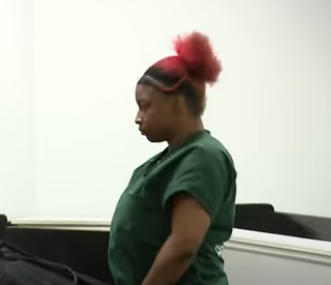Detroit Teen Faces Trial After Nonfatal Shooting at Bus Stop
A serious incident unfolded in Detroit involving a 16-year-old girl, Princess Diana Jennings Carter, who is now headed to trial for allegedly shooting a 13-year-old boy at a bus stop. The shooting occurred on April 23rd, near Seven Mile Road and Gilchrist, and has drawn considerable attention from the community and legal authorities. The case has escalated with prosecutors seeking to try the teenage girl as an adult, reflecting the severity of the charges against her.

Incident and Victim’s Condition
The victim, a 13-year-old boy, suffered a nonfatal gunshot wound that struck his leg. His injuries were severe enough that, during court proceedings, he required the assistance of a walker to take the stand and testify. The shooting incident shocked the local neighborhood and sparked an investigation by the Detroit Police Department.
Arrest and Charges
Following the shooting, Princess Diana Jennings Carter was arrested alongside another juvenile who was also involved in the incident. During the court hearing, she was formally charged as an adult with several serious offenses. The charges include assault with intent to murder, an additional assault charge, carrying a weapon with unlawful intent, and three felony firearm-related charges. The gravity of these charges illustrates the legal system’s approach to holding juveniles accountable when involved in violent crimes, especially those involving firearms.
Evidence Presented in Court
A key element of the prosecution’s case involved video evidence. Surveillance footage from a nearby Green Light location captured the shooting, providing clear visual material that linked Jennings Carter to the event. The video became a pivotal point in the courtroom as it was presented before the judge and jury.
In addition to the video, a Detroit police officer who had prior encounters with Jennings Carter positively identified her in the footage. The officer confirmed recognizing her by her distinct hairstyle, which remained consistent from previous meetings to the time of the shooting. This eyewitness identification bolstered the prosecution’s argument that Jennings Carter was the individual responsible for the shooting.
Court Proceedings and Judge’s Decision
During the hearing, the judge carefully reviewed the evidence presented, including the video and officer’s testimony. After considering these details, the judge found sufficient grounds to bind Jennings Carter on four of the six counts she faced. This decision meant the case would move forward toward trial, with a formal acknowledgment of the strong evidence against her.
Jennings Carter’s next court date was scheduled for May 28th, where further legal proceedings will determine her fate. Given the severity of the charges and the prosecution’s push to try her as an adult, the trial is expected to be closely watched by the public and the media alike.
Community Impact and Broader Context
This shooting incident at a bus stop, a public and everyday setting, has raised serious concerns within the Detroit community about youth violence and firearm access. The fact that a 13-year-old was targeted and injured at a place where children commonly gather to travel to school or other activities underscores the challenges faced in ensuring public safety.
The case also highlights the difficult legal and social questions surrounding juvenile offenders charged with serious violent crimes. Prosecutors opting to try Jennings Carter as an adult reflects a broader trend in which the justice system weighs the nature of the offense alongside the age of the accused. This approach sparks debate about rehabilitation prospects versus public safety and accountability.
Conclusion
The shooting of a young boy at a Detroit bus stop by a teenage girl has led to a high-profile legal case. Princess Diana Jennings Carter faces multiple serious charges and will stand trial as an adult, a decision supported by video evidence and police testimony. As the community grapples with the ramifications of this event, the upcoming court dates will play a critical role in addressing justice for the victim and accountability for the accused. The case serves as a sobering reminder of the ongoing issues related to youth violence and firearm-related crimes in urban areas.






